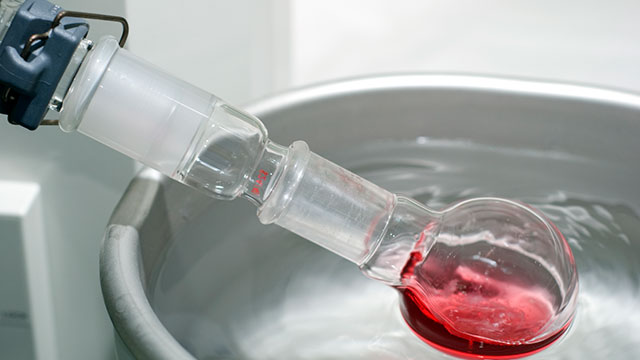
Rotary evaporators are standard laboratory equipment found in nearly all laboratories. Chemical, pharmaceutical, food, and environmental industries are the most common users, but rotary evaporators, or “rotovaps,” may be found wherever processes require sample concentration or solvent distillation.
All rotary evaporators include a heating bath, condenser, collecting vessel, and rotating sample or distillation flask. BUCHI Corporation (New Castle, DE), a leading manufacturer of rotovaps, still sells a large number of those simple units to academic and even industrial labs. But another world of rotary evaporation exists for laboratories that value application versatility, automation, and connectivity.
“Our largest-volume market has been and remains pharmaceuticals, and they’re willing to pay for a high degree of automation, for many features that go beyond simple rotovaps,” says Jason Wagner, VP of marketing at BUCHI. “But there’s still a big market for stripped-down, no-frills models.”
A “full system” has a chiller to replace the use of cold tap water in the condenser unless dry ice is readily available. In place of the simple aspirator or house vacuum you may now be using, you could enjoy the benefits of a real vacuum pump, which is chemically inert and quiet. Worried about samples bumping into the condenser and collection vessel? A vacuum controller will solve that problem without the user having to give it a second thought.
Unlike with some laboratory products where purchasers must outsource upgrades and modifications, top rotovap vendors supply all the necessary components.
Since modern rotary evaporators operate at up to 5 L at benchtop scale and at 20 to 50 L for industrial models, general solvent recycling becomes an attractive alternative to dedicated distillation systems. Low-temperature condensation traps even volatile solvents like ether and methylene chloride, while high vacuum enables recycling of polar aprotic solvents like dimethylformamide or distillation of essential oils.
Need more information on evaporators? Download the free Lab Manager Evaporator Resource Guide
Every user of rotary evaporators has experienced bumping. Vacuum controllers virtually eliminate such mini-disasters by allowing a vacuum gradient. “That’s where automation really comes in,” Wagner says. “The controller and AutoDest sensor measure whether the condenser is heating and adjust vacuum accordingly.” Similarly, a foaming sensor can tell whether the distillation is getting out of control. “And all the user has to do is say go.”
The wide variation in features and price and the low potential dollar entry point for rotary evaporator acquisition are somewhat unusual in the world of laboratory equipment. Yet despite the lingering fondness for simple rotovaps, nearly every laboratory can benefit from automation, says Thomas Ketterer, head of application support at IKA Works (Staufen, Germany). “The reasons are enhanced safety, the capability for unattended operation, consistency of conditions, and results.”
A call for simplicity?
Jim Dawson, president of Heidolph North America (Elk Grove Village, IL), believes that automation may be overhyped. “Researchers want to be able to run their processes uninterrupted but to get involved easily if the need arises. Chemists are hands-on, highly visual types of researchers. They may wish they could walk away from what they’re doing completely and still achieve the desired result, but they don’t do that in practice. They want simplistic automation, not something complicated. They want automated vacuum control and measurement, and want to know that when the evaporation is completed the flask will come out of the bath, but it has to be simple. And they don’t want to spend a lot of money on it if they don’t have to.”
The ability to have many options at varying price points is a hallmark of rotary evaporators. “Chemists don’t want to be boxed in to one level of sophistication; they want to pick and choose specific options and do that with an associated price as well,” Dawson says.
Greening Your Evaporation
Find out about the recent environmentally-friendly advances in nitrogen evaporator technology. LabManager.com/green-evaporation
For additional resources on Rotary Evaporators, including useful articles and a list of manufacturers, visit LabManager.com/evaporators











